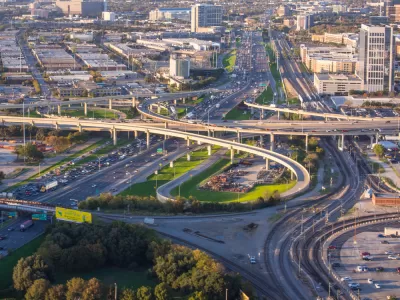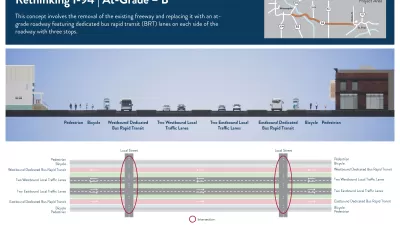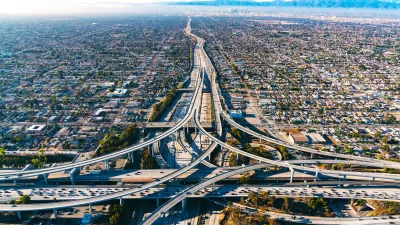Rather than removing the freeway altogether, which the Texas Department of Transportation calls ‘unfeasible,’ the agency recommends burying the road in a billion-dollar, ten-lane trench through the city’s downtown.

“For many years now, TxDOT has studied the feasibility of removing Interstate 345, which is a 1.7-mile segment of elevated highway that dissects downtown Dallas in Deep Ellum.” But after concluding that “removing the highway is unfeasible,” Joe Cortright writes in Strong Towns, “TxDOT now recommends tearing down the elevated freeway and rebuilding it in a 65-foot-deep trench that will contain 10 travel lanes and cost more than a billion dollars.”
According to Cortright, “If this hybrid approach moves forward, it seems to send a pretty clear message that highway capacity and maintaining commute times are the central priority of the Dallas Metro, not reconnecting neighborhoods or improving the downtown neighborhood quality of life.”
The article describes the original proposal for removing the freeway. “Urban planners Kennedy and Brandon Hancock first pitched the idea of tearing I-345 out, which would free up land the city could re-zone to create a mix of housing, office, and retail. The D Magazine article says TxDOT estimated in 2016 that removal would generate about $2.5 billion in new net value, a ‘significant increase in employment totals,’ and an additional $67.4 million in property tax revenue over 30 years.”
For more details on the TxDOT recommendation, listen to the latest episode of Strong Towns’ Upzoned podcast.
FULL STORY: TxDOT Proposes to Dig a $1 Billion Infrastructure Grave in Downtown Dallas

Planetizen Federal Action Tracker
A weekly monitor of how Trump’s orders and actions are impacting planners and planning in America.

DARTSpace Platform Streamlines Dallas TOD Application Process
The Dallas transit agency hopes a shorter permitting timeline will boost transit-oriented development around rail stations.

Congressman Proposes Bill to Rename DC Metro “Trump Train”
The Make Autorail Great Again Act would withhold federal funding to the system until the Washington Metropolitan Area Transit Authority (WMATA), rebrands as the Washington Metropolitan Authority for Greater Access (WMAGA).

Supreme Court Ruling in Pipeline Case Guts Federal Environmental Law
The decision limits the scope of a federal law that mandates extensive environmental impact reviews of energy, infrastructure, and transportation projects.

Texas State Bills to Defund Dallas Transit Die
DART would have seen a 30% service cut, $230M annual losses had the bills survived.

Bikeshare for the Win: Team Pedals to London Cricket Match, Beats Rivals Stuck in Traffic
While their opponents sat in gridlock, England's national cricket team hopped Lime bikes, riding to a 3-0 victory.
Urban Design for Planners 1: Software Tools
This six-course series explores essential urban design concepts using open source software and equips planners with the tools they need to participate fully in the urban design process.
Planning for Universal Design
Learn the tools for implementing Universal Design in planning regulations.
Roanoke Valley-Alleghany Regional Commission
City of Mt Shasta
City of Camden Redevelopment Agency
City of Astoria
Transportation Research & Education Center (TREC) at Portland State University
US High Speed Rail Association
City of Camden Redevelopment Agency
Municipality of Princeton (NJ)





























